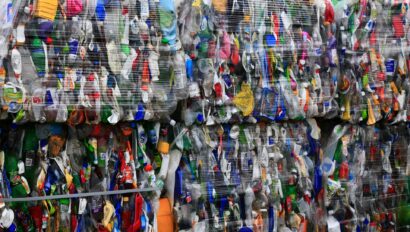Textile Exchange News Release – 2030 Strategic Direction and Conference Outcomes
Read full release here [EMBARGOED UNTIL NOVEMBER 11, 2019 AT 9AM US EASTERN]
Textile Exchange Sustainability Conference catalyzes action to address the most urgent impacts.
Textile Exchange just completed another record-breaking Textile Sustainability Conference in Vancouver, British Columbia on October 15-18. The 2019 conference was the largest conference on the topic of sustainable textiles ever held in North America with more than 900 industry leaders registered from 48 countries! The conference served as the platform for Textile Exchange to announce its new 2030 Strategy: Climate+, which is all the more fitting that for the first time in its history, the conference was recognized as being climate neutral.
The 2019 Textile Sustainability Conference brought industry leaders and decision-makers together to CONNECT with a diverse group of leaders from across the global supply chain, to LEARN from industry experts on today’s most pressing sustainability topics, and to PARTICIPATE in workshops, Preferred Fiber and Material Round Tables, and sessions that were focused on taking action and driving change.
Textile Exchange’s annual conference has become known as a community for industry collaboration. The 2019 Textile Sustainability Conference facilitated industry partner meetings and significant industry announcements. Among these announcements, Textile Exchange announced its new 2030 Strategy: Climate+ (pronounced Climate-Plus). Under the Climate+ strategic direction, Textile Exchange will be the driving force for urgent climate action with a goal of 35-45% reduced CO2 emissions from textile fiber and material production by 2030.[1],[2]
The Climate+ Strategy is the result of extensive stakeholder engagement through interviews and an online survey conducted with a mix of Textile Exchange members and non-members from organizations representing brands, retailers, suppliers, manufacturers, nonprofits and professional services across the globe.
Textile Exchange’s Managing Director, La Rhea Pepper said, “The Climate+ Strategy is a way to bring the priority of climate, biodiversity, and carbon to the heart of our work with preferred fibers and materials.”
For years, Textile Exchange has promoted practices, standards, and resources that benefit the climate. Adopting the Climate+ Strategy makes climate a deliberate priority and organizational focus for an impact area that requires immediate attention and for which we have many existing tools and resources. The “+” in Climate+ allows Textile Exchange to prioritize climate while continuing to address other impact areas that are interconnected with climate in most situations (e.g., water, biodiversity, forests, soil and animal welfare). The “+” is also an acknowledgement that Textile Exchange cannot achieve this new 2030 goal of 35-45% reduction in CO2 emissions from preferred fiber and material production on its own. Achieving the Climate+ goal will require strong partnerships to accelerate adoption of existing tools as well as enable disruptive innovation around new business models and zero carbon materials.
Examples of these key partnerships were threaded throughout the conference from the previously mentioned partnership with South Pole in making the conference climate neutral to providing a space for organizations to hold meetings and make significant announcements that accelerate the industry towards achieving the 2030 goal.
Textile Exchange partnerships led to the following announcements being made at the conference:
Textile Exchange partners TextileGenesis to pilot viscose and wool chain of custody using blockchain technology.
Textile Exchange (who owns the Content Claim Standard, Organic Content Standard, Recycled Claim Standard, Global Recycled Standard, Responsible Wool Standard and Responsible Down Standard) announced a partnership to pilot its chain of custody on the viscose and wool textile supply chain using the TextileGenesis pioneering blockchain transparency platform.
The partnership will explore the integration of Textile Exchange’s Central Database System (a chain custody platform jointly developed with GOTS) and TextileGenesis’ blockchain solution – a collaborative milestone towards maximising the value of digital traceability and physical verification for certified sustainable fiber and materials.
“Textile Exchange has created the space where the industry comes together to share best practice and drive progress towards industry transformation. We’re excited to bring our technology into that forum – to help drive meaningful change and measurable impact” says Amit Gautam, CEO & Founder of TextileGenesis.
The pilot is carried out in partnership with Lenzing, ArmedAngels, and Schneider group on the viscose and wool supply chain.
Textile Exchange and the International Trade Centre (ITC) are collaborating to enhance the transparency and traceability of sustainable textile value chains.
Textile Exchange and the International Trade Centre (ITC) are collaborating to support brands, manufacturers, and factories in their efforts to improve the transparency and traceability of their sustainability efforts while at the same time supporting factories in adopting sustainable business practices. Technology applied for good, can contribute to achieving the United Nations’ Sustainable Development Goals, as established in the United Nations’ 2030 Agenda for Sustainable Development.
Textile Exchange and ITC will focus their collaboration on:
- i) enabling factories to gain visibility in international supply chains and facilitating the recognition of valid and credible factory certification claims, by exposing trusted information from Textile Exchange via the Sustainability Map, one of ITC’s Global Public Good platforms;
- ii) providing Textile Exchange and other standard organizations with a unique reference for each certified business through the implementation of an algorithm;
iii) eliminating any potential trust issues when sharing certified businesses’ data by establishing a semi-centralized certification distributed ledger, backed by blockchain or another distributed ledger solution.
H&M Group and IKEA collaborate on large-scale study within recycled textiles.
During the 2019 Textile Sustainability Conference, H&M Group and IKEA announced a collaboration on a large-scale study, reviewing chemical content in post-consumer textile recycling. Both brands have the ambition to become 100% circular and renewable by 2030 and plan to achieve this through the use of recycled or renewable materials.
Access H&M Group’s news release.
Royal Golden Eagle (RGE) commits US$200 million to Next-Generation Textile Fibre Innovation and Technology.
Leading resource-based manufacturing group Royal Golden Eagle (RGE) has announced plans to invest $200 million USD over the next 10 years into cellulosic textile fiber research and development.
The investment, revealed at the Textile Exchange Sustainability Conference in Vancouver, will support solutions in alternative cellulose or plant-based feedstock and closed-loop manufacturing. The target allocation for the investment is 70:20:10 in three areas, respectively: scaling up proven clean technology in fiber manufacturing, bringing pilot scale production to commercial scale, and R&D in emerging frontier solutions.
C.L.A.S.S. joined Textile Exchange Sustainability Conference 2019 in Vancouver bringing smart innovation across fashion’s sustainable epicenters.
C.L.A.S.S. the global platform for sustainable materials, fibers and textiles for the fashion business demonstrated to be ready for its world tour in some of the most cutting-edge venues and events truly committed to ‘weave’ a better future. The first appointment was the Textile Exchange conference, a unique opportunity to discover smart and cutting-edge innovations.
Download C.L.A.S.S.’s press release.
Textile Exchange accredits the success of the 2019 Textile Sustainability Conference to sponsors, exhibitors, the engaged participants, including more than 200 presenters, and partnering organizations that contributed their time and expertise over the four-day event.
SAVE THE DATE!
Join us for the 2020 Textile Sustainability Conference in Dublin, Ireland the first week of November 2020!
[1] Scope is pre-spinning. Measured from a 2017 baseline; subject to Science Based Targets validation.
[2] The range reflects the additional work we would like to do to ensure our target is aligned with a 1.5-degree Celsius scenario (defined by the UN IPCC), aligned with Science Based Targets as well as with the UNFCCC Fashion Climate Charter.

